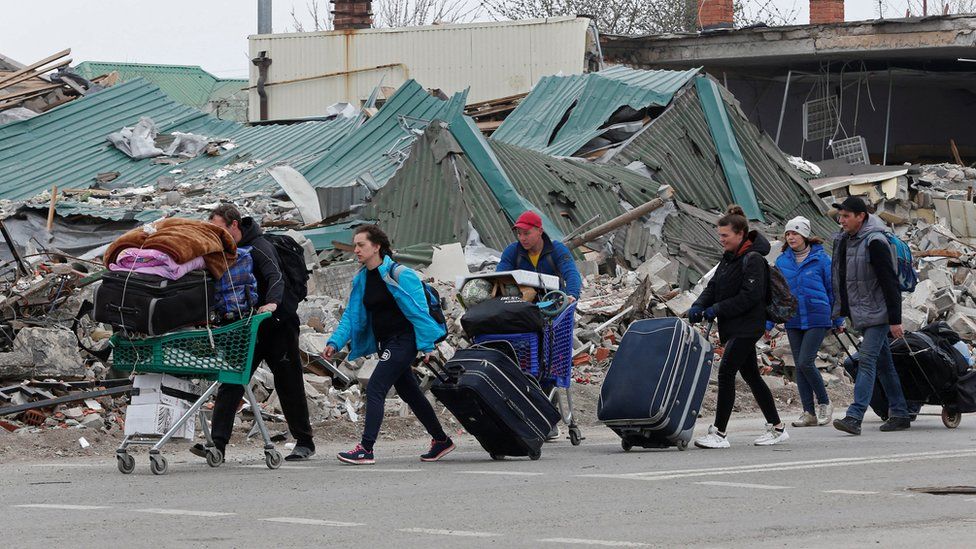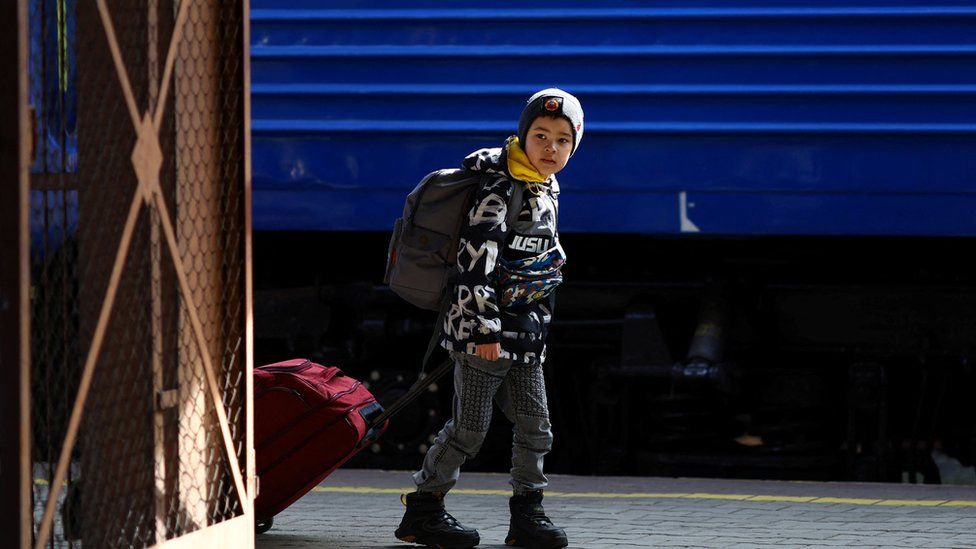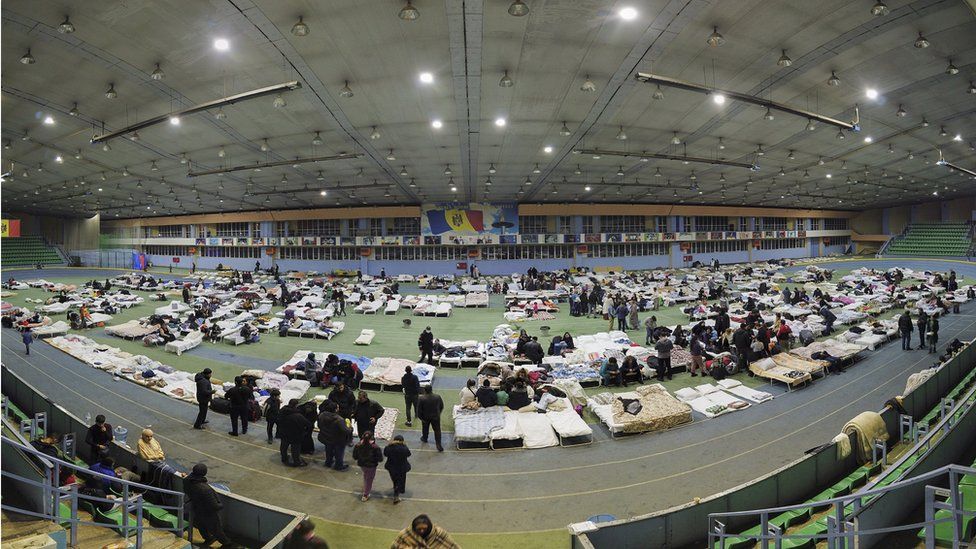More than 11 million people are believed to have fled their homes in Ukraine since the conflict began, according to the United Nations.
As well as the 5.3 million who have left for neighboring countries, another 6.5 million people are thought to be displaced inside the war-torn country itself.

Where are people fleeing inside Ukraine?
Ukraine's Deputy Prime Minister, Iryna Vereshchuk, warned people in the east of the country to evacuate ahead of the latest Russian assault, or risk their lives.
It's not clear how many people were able to leave.
The UN's 6.5 million figure is based on research carried out by the International Organization for Migration (IOM) between 9 and 16 March.
The actual total is likely to have increased in the subsequent weeks.
Of the 2,000 internally displaced people.
- Nearly 30% had come from Kyiv, more than 36% had fled from the east of Ukraine and 20% had come from the north.
- Nearly 40% were now in the west of Ukraine, with less than 3% in Kyiv.
- Only 5% had left their homes in anticipation of the invasion, with the vast majority fleeing either at the start of the war or when it reached their area.
More than half of the people who are internally displaced are women, and many are deemed particularly vulnerable because they are pregnant, have a disability or are a victim of violence.
What is being done for refugees within Ukraine?
The UN, which is working alongside other organizations to provide help to people in Ukraine, says it is offering humanitarian assistance "wherever necessary and possible". This includes:
- Giving cash to people for basics like food and rent.
- Delivering supplies from west to east, including food and tarpaulins for homes damaged by shelling.
- Providing folding beds to people in bomb shelters.
- Setting up reception and transit points for internally-displaced people.
About 12 million people are also thought to be stranded or unable to leave areas affected by the fighting.

Where are Ukraine's refugees going?
Refugees are also crossing to neighboring countries to the west, mostly Poland.
The UN says that as of 27 April, more than 5.3 million people have left Ukraine:
- Poland has taken in 2,968,716 refugees.
- Romania 801,453.
- Russia 641,752.
- Hungary 507,849.
- Moldova 439,290.
- Slovakia 363,940.
- Belarus 24,857.
Some people have travelled from Moldova into Romania and so are included in both countries' totals.
Poland, Hungary and Slovakia are part of the Schengen area, where there are no internal border controls.
This means many of those counted when they initially crossed into these countries may have since travelled to other countries.
For instance, the Czech Republic's interior ministry said that as of 27 April, it had granted 314,583 emergency visas to Ukrainian refugees.
How are refugees leaving Ukraine?
Trains heading towards Ukraine's border have been packed, and there have been long queues of traffic on roads leading out of the country.
Refugees don't need all their official documents, but it is helpful if they can provide identification cards or passports, birth certificates of children travelling with them and medical documentation.
To get refugee status, they need to be Ukrainian citizens or people legally living in Ukraine, such as foreign students.
There have been reports of people from African countries being prevented from leaving Ukraine.
What help are countries offering refugees?
In countries bordering Ukraine, refugees can stay in reception centers if they can't stay with friends or relatives. They are given food and medical care, and information about onward travel.
The EU has granted Ukrainians who flee the war a blanket right to stay and work throughout its 27 member nations for up to three years.
They will also receive social welfare and access to housing, medical treatment and schools.
The government of Poland, which has received the highest number of refugees, has said it will need more money than the EU is currently offering in order to host the number of people arriving there.
Moldova, which has the largest concentration of refugees per capita, has also appealed for international help in dealing with the numbers arriving.

What is the UK doing to help Ukrainian refugees?
The UK launched a family visa scheme for Ukrainians who have an immediate or extended family member in the UK.
After the government was criticized for the speed and scale of its response, it also launched the Homes for Ukraine scheme to allow those without relatives in the UK to settle here.
Under this scheme, people in the UK can nominate an individual or family to stay with them rent-free for at least six months.
Refugees who come via the scheme will be able to live and work in the UK for up to three years, and access healthcare, welfare and schools.
Applications are made online, and both hosts and refugees will be vetted. Hosts will receive £350 a month and there will be no cap on the numbers able to come to the UK.
However, some families who have applied to be sponsors have complained that the system is too slow and complicated.
Home Secretary Priti Patel has apologized for the "frustrating" delays.
As of 28 April, 86,100 visas had been issued through both schemes, out of 117,600 applications.
Poland feels the strain of Ukraine's refugees.
The kicks are high and the punches straight, but the Ukrainian children here are delivering them in an environment of peace: a karate class for new arrivals in eastern Poland.
The 14 students are given the basic moves by a Polish teacher, who ensures there's plenty of laughter. For this hour at least, the trauma they've gone through in the past fortnight is replaced by enjoyment.
Some of them have family back at home fighting for real. Fourteen-year-old Dariy Gulyk hasn't heard from his father for three days and is worried. The emotions make it hard to feel settled here.
"In Poland, it's very cool", he says, "but we want to go home - because home is home."
His cousin, Sasha, 17, appreciates the temporary distraction.
"When we're in the karate class, we forget about the war at that moment", he says, "but when it ends, we remember again, and we understand we must do all we can to help our people in Ukraine."
The class takes place in the small eastern Polish town, population 60,000. Its beautiful old center, a UNESCO World Heritage Site, is dotted with Renaissance churches and colored facades: a far cry from the horror unfolding across the border.
It, like many others across Poland, has been transformed in the past two weeks into a refugee hub. On some days, up to 35,000 people have arrived - most going on further west but some staying. Around a thousand beds have been provided at the reception center, schools, private homes and even the sports club where the karate class takes place.
'Left alone'.
The mayor, Andrzej, says it's a huge strain, warning that the welcome has its limits.
"Polish people seem infinitely ready to give, but it will end one day", he says. "We thought there would be a first wave of refugees and then we would get significant support from the government and the EU but it turns out we were left alone. We need financial help or the quality of our hospitality will drop drastically."
The impulse to offer refuge is partly due to its history as a place that has known the cost of oppression. Almost half of its pre-war population, some 12,000 people, were Jews. During occupation first by the Soviets and then the Nazis, most were sent to the ghetto here and then to concentration camps. A monument to the tragedy, made from the headstones in the town's old Jewish cemetery, stands on the outskirts.
The locals here are proud of their heritage of hospitality, extended to the new arrivals. The restaurant at the Renesans hotel is now only cooking for refugees. In the kitchen, pots of Ukrainian beetroot soup and fruit compote bubble away, as staff box up portions of pork ribs and pasta.
The owner, Damian Poterucha, says as a father, it was a natural decision to change his business once he saw the children fleeing the war.
"I can't believe Polish people are responding like this", he says, "it's nice to see."
But he says he's running short of money and can only continue offering the handouts for another two weeks. "After that, I will think about what I can do next", he adds.
'Help from the world'.
The food is delivered to the main shelter, where some 300 volunteers help out. All the while, buses arrive with new arrivals - and others leave, taking those on board to larger cities in the west, where many of the refugees have friends or family.
"We need help from the world", says Barbara Godziszewska, a town hall employee now helping to serve hot food. "Everybody looks at us and gives us a 'bravo', but it's too small - someone needs to tell us what we can do with the refugees. If the numbers continue like this, I'm afraid maybe they'll go on the street to sleep because every hotel is full."
In the space of a fortnight, Poland has gone from rejecting migrants from the Middle East to opening its arms to those from Ukraine. There is discomfort among some Poles with what appears to be a volte-face by their government, from pushing away the mainly Muslim men of Syria to welcoming the predominantly white, Christian women and children of Ukraine.
But Poland's migration policy will be pored over by historians in future years. For now, the focus is on the present influx. And as the fighting worsens in Ukraine - and begins to spread to the west - towns like Zamosc are wondering how long they can cope.



You must be logged in to post a comment.